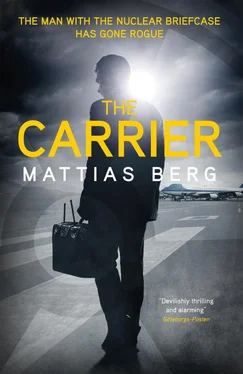Mattias Berg - The Carrier
Здесь есть возможность читать онлайн «Mattias Berg - The Carrier» весь текст электронной книги совершенно бесплатно (целиком полную версию без сокращений). В некоторых случаях можно слушать аудио, скачать через торрент в формате fb2 и присутствует краткое содержание. Город: London, Год выпуска: 2019, ISBN: 2019, Издательство: MacLehose Press, Жанр: Триллер, на английском языке. Описание произведения, (предисловие) а так же отзывы посетителей доступны на портале библиотеки ЛибКат.
- Название:The Carrier
- Автор:
- Издательство:MacLehose Press
- Жанр:
- Год:2019
- Город:London
- ISBN:978-0-85705-788-4
- Рейтинг книги:4 / 5. Голосов: 1
-
Избранное:Добавить в избранное
- Отзывы:
-
Ваша оценка:
- 80
- 1
- 2
- 3
- 4
- 5
The Carrier: краткое содержание, описание и аннотация
Предлагаем к чтению аннотацию, описание, краткое содержание или предисловие (зависит от того, что написал сам автор книги «The Carrier»). Если вы не нашли необходимую информацию о книге — напишите в комментариях, мы постараемся отыскать её.
The Carrier — читать онлайн бесплатно полную книгу (весь текст) целиком
Ниже представлен текст книги, разбитый по страницам. Система сохранения места последней прочитанной страницы, позволяет с удобством читать онлайн бесплатно книгу «The Carrier», без необходимости каждый раз заново искать на чём Вы остановились. Поставьте закладку, и сможете в любой момент перейти на страницу, на которой закончили чтение.
Интервал:
Закладка:
At other times I clicked away with my magical Bruegel cube from Peer. Changed “The Tower of Babel”, with the cloud of smoke extending from the apertures in the building, through the other works all the way to “The Fall of the Rebel Angels” and back again. Checked the functionality of the hybrid twice each day. The keyboard’s launch mechanisms, the safety procedures, the whole process. The age-old information with the President’s options in case of a nuclear attack. “The biscuit”. And in the late evenings I went for dogged runs outside when the whole building closed down at night, tasted freedom. Listened to the sounds from the apartments below us. The clinking and the music, the soft murmuring.
At night—before the dreams took over, those terrible images—I was convinced that they had to be the sound of prayers. A sort of plea for the future of mankind.
I also began to re-read my dissertation, from cover to cover. Looked at my reproduction of “The Triumph of Death”, rolled up in my pack. Forever trying to find some sort of answer to it all: the enigma which I was facing.
And then there was the homework which Ingrid had given me. Together we watched the ending of “Mata Hari”, over and over again. Recognized the subliminal effects of the steganographic message. “THESE ARE THE CODES—THAT WILL MAKE THE CODES SUPERFLUOUS”. We let it wash over us both, in strange long sessions, as we had during our work on my dissertation. Systematically burned the codes into our synapses.
Ingrid hardly ever left her command terminal, never went out, barely ever got up from the mattress on the floor except to prepare food or go into the bathroom. When the leftovers from our Christmas dinner ran out—both the turkey and the panettone—there was the whole of the larder to get through. She made soup from lentils and beans, pasta dishes with no real taste: food for food’s sake.
And then we stared through the window. I gazed far away into the distance, down toward the sea, the escape I could never really bring myself to make, however many opportunities my evening runs miles away from the apartment afforded me. Looked at the world as if each sight was going to be my last. She seemed to gaze in a more concrete way, examining, reconnoitering. Always fully on the look-out for our pursuers.
But eventually there was not much else to resort to except the T.V. As time passed we left C.N.N. on throughout the day, bellowing out the world’s course, that theatrical chatter which was both comforting and threatening. Especially since it was increasingly about our issue in particular, our field. What Ingrid called her arrangements .
The evening programs began more and more often with the headline “THE NUCLEAR WEAPONS SCANDAL”, white block letters against a black background. There were now two additional bullet points in the short summary:
April 2013:
In an unprecedented move, an Air Force commander stripped 17 of his officers of their authority to control and launch nuclear missiles.
The officers, based in Minot, North Dakota, did poorly in an inspection. They were ordered to undergo 60 to 90 days of intensive refresher training on how to do their jobs.
August 2013:
A missile unit at Malmstrom Air Force Base failed a safety and security inspection “after making tactical-level errors – not related to command and control of nuclear weapons,” the Air Force Global Strike Command said.
The 341st Missile Wing operates about 150 of the 450 Minuteman III nuclear-tipped intercontinental ballistic missiles in the U.S. forces, according to an Air Force statement.
October 2013:
A military officer with high-level responsibility for the country’s nuclear arsenal lost his job.
He was formally relieved of his duties as deputy chief of U.S. Strategic Command. A military official said his demotion was connected to allegations that he used counterfeit gambling chips at a casino.
October 2013:
Just days later, a U.S. general who oversaw nuclear weapons was relieved of his duties after he boozed, fraternized with “hot women” and disrespected his hosts during an official visit to Russia, Air Force officials said.
The General led the 20th Air Force, responsible for three nuclear wings.
According to an Air Force Inspector General report, he bragged loudly about his position as commander of a nuclear force during a layover in Switzerland, saying he “saves the world from war every day”.
December 2013:
The Secretary of Defense is forced to resign—in the wake of what is now generally known as the Nuclear Weapons Scandal.
January 2014:
At the Montana base, 34 Air Force officers entrusted with maintaining nuclear missiles are accused of cheating or turning a blind eye to cheating on a competency test.
One evening toward the end of January 2014 there was also a feature which the news anchor delivered with a slight smile. She announced that the channel’s special reporter had at last been given access to one of our large missile bases, after months of negotiation, although the reporter had promised not to reveal which base it was. But according to our sources, the news anchor continued, conditions are approximately the same everywhere. “And this is what our reporter saw. Look carefully: you will not believe your eyes!”
What followed was an almost satirical piece about the analog technology at the nuclear weapons bases. For the female reporter who had managed to get into the top security base, everything seemed as laughable as it was terrifying: the enormous missiles, the pointless round-the-clock state of readiness, the huge cracks in the facade.
She latched in particular onto the fact that the guidance system still used floppy discs to store the literally life-or-death information. That both the codes and the procedures existed only on what remained of this age-old technology, with no reasonable possibility of backup or synchronization with other systems. Her facial expressions heavy with meaning, the reporter also revealed that there was only one functioning adjustable spanner to tighten the nuts on the warheads of our 450 Minuteman III missiles. And that this spanner was couriered back and forth between our underground nuclear missile bases in North Dakota, Wyoming and Montana.
She could not say, nor even understand, that this was how we wanted it. That Edelweiss had in the end managed to persuade us in the Team of the increasing superiority of the low-technology approach. That the absence of an industrial standard and any recognizable structures made it much more difficult for anybody to penetrate our systems using high-tech methods. That our most senior commanders had started to take their critics seriously some years ago. Those who were sounding warnings that a system which was always “on-line” and in “stand-by mode”, with several thousand nuclear missiles ready to destroy our civilization in just a few minutes, had to be the most attractive of targets for the world’s most advanced hackers. Regardless of what their motives might be.
At the same time, an amorphous system like this made Ingrid’s work in linking it all together even more complex. But, as she herself used to say in reply to the students’ repeated complaints that everything was so endlessly complicated, all these links between different disciplines and centuries constituted the very historical framework of moral philosophy: “And who ever said that it was going to be simple?”
But there was still nothing on the news about our flight, hers or mine. About the briefcase itself having been removed from the system, together with one of the two portable command terminals. Not a word about the most fateful thing of all.
And that same evening I found the courage to ask Ingrid why. She turned her eyes away from the televisions. Explained it once more, as if to a child.
Читать дальшеИнтервал:
Закладка:
Похожие книги на «The Carrier»
Представляем Вашему вниманию похожие книги на «The Carrier» списком для выбора. Мы отобрали схожую по названию и смыслу литературу в надежде предоставить читателям больше вариантов отыскать новые, интересные, ещё непрочитанные произведения.
Обсуждение, отзывы о книге «The Carrier» и просто собственные мнения читателей. Оставьте ваши комментарии, напишите, что Вы думаете о произведении, его смысле или главных героях. Укажите что конкретно понравилось, а что нет, и почему Вы так считаете.












